|
|
|
Sort Order |
|
|
|
Items / Page
|
|
|
|
|
|
|
| Srl | Item |
| 1 |
ID:
106152
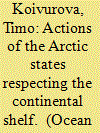

|
|
|
| 2 |
ID:
001499


|
|
|
|
|
| Publication |
Wales, Welsh Academic, 1995.
|
| Description |
xx,165p.
|
| Standard Number |
9781860570186
|
|
|
|
|
|
|
|
|
|
|
|
Copies: C:1/I:0,R:0,Q:0
Circulation
| Accession# | Call# | Current Location | Status | Policy | Location |
| 041019 | 305.80094/AST 041019 | Main | On Shelf | General | |
|
|
|
|
| 3 |
ID:
121152
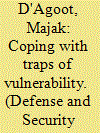

|
|
|
|
|
| Publication |
2013.
|
| Summary/Abstract |
In a world virtually free of slavery and colonialism and one mainly driven by the sovereign state rationale, allusion to manifestations or the existence of some form of these phenomena within a state is often received with dumbfounding indifference or denial. However, a form of rule that had continued in South Sudan long after the departure of the British in 1956 was colonial both in its quintessence and flair in that it disenfranchised its citizens and denied them the most basic freedoms, services and development. Under this establishment, resistance against the coercive vision of the state was brutally suppressed for many decades. This state of affairs finally ended in July 2011. Nonetheless, there is a miscellany of unresolved post-colonial issues between the two countries that warrant attention. These include security and the demarcation of borders, the issue of ludicrous transit fees for South Sudan's oil exportation through Sudan, citizenship, external debt repayment, etc. These issues are part of traps inherited from the anti-colonial struggle, which have now supplanted the old ensemble of North-South conflict paroxysm. As a matter of urgency, the two countries will have to wrap up the incomplete process of negotiation on these substantive issues. The talks should be approached with a new mindset based on the new reality of two sovereign states. To the extent that it is widely established that South Sudan and Sudan must coexist peacefully in order to develop into viable entities, such mutual dependency must be based on equality and respect.
|
|
|
|
|
|
|
|
|
|
|
|
|
|
|
|
| 4 |
ID:
116056


|
|
|
|
|
| Publication |
2012.
|
| Summary/Abstract |
This article examines the case for Jammu and Kashmir's independence from India as a matter of remedial justice within the context of a moral right to secede premised upon the circumstances of the state's 1947 inclusion within the Indian union. Principles of remedial justice are defended as a suitable basis for adjudicating rival claims to sovereignty and negotiating secessionist disputes. The case for Kashmir's secession as a matter of remedial justice is then investigated with reference to the claims that India attempted to seize the former princely state by force and reneged on the promise of a plebiscite to ratify its sovereignty. This article argues that, while a contractual understanding of these claims might yield a coherent explication of a right to secede, this would not include a right to independent statehood and should be rejected because of the corollary that Dogra rule was morally legitimate. By contrast, the state's right to secede might be justified by reference to the claim that the events of accession violated its inhabitants' rights to popular sovereignty and self-determination. However, while offering a more plausible account of a right of secession, such a justification would not be a specifically remedial one and would fail to include many of the benefits of a remedial right. Consequently, we need to look beyond the historical events surrounding the state's accession as the basis for reconciling competing claims regarding Kashmir's rightful political status within a framework of remedial justice.
|
|
|
|
|
|
|
|
|
|
|
|
|
|
|
|
| 5 |
ID:
098059


|
|
|
| 6 |
ID:
139571


|
|
|
|
|
| Summary/Abstract |
This article focuses on two questions regarding the movement of persons across international borders: (1) do states have a right to unilaterally control their borders; and (2) if they do, are migration arrangements simply immune to moral considerations? Unlike open borders theorists, I answer the first question in the affirmative. However, I answer the second question in the negative. More specifically, I argue that states have a negative duty to exclude prospective immigrants whose departure could be expected to contribute to severe deprivation in their countries of origin. Countries have a right to unilaterally control their borders, but their exercise of this right is constrained by the demands of morality.
|
|
|
|
|
|
|
|
|
|
|
|
|
|
|
|
| 7 |
ID:
122775
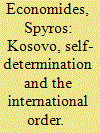

|
|
|
|
|
| Publication |
2013.
|
| Summary/Abstract |
Yugoslavia's wars provide a rich example of the range of challenges posed to international stability and fundamental principles of international relations since 1989. Within this context, Kosovo's independence has now become a cause celebre of the use of the principle of self-determination in state-creation. In addition, the case of Kosovo is an important development in the practice of humanitarian intervention and by implication the evolution of the concept of the Responsibility to Protect. To better understand the effects of Kosovar claims to self-determination on international order, a clearer understanding is required of the factors shaping that order and how self-determination (as it emerges from the road to Kosovo's independence) relates to those factors. The issue of 'self-determination after Kosovo', is placed here into both the context of Yugoslavia's collapse and a number of broader key features which could be said to have played a dominant role in shaping international order post-1989.
|
|
|
|
|
|
|
|
|
|
|
|
|
|
|
|
| 8 |
ID:
171146


|
|
|
|
|
| Summary/Abstract |
Lafkenche and Williche, the Mapuche coastal population in Chile, used coastal marine areas and resources for centuries. The Spanish colonization and the subsequent establishment of the Republic of Chile curtailed these access rights and traditional uses. In 2008, the government of Chile introduced the “Lafkenche Law” establishing exclusive access rights for traditional indigenous use of coastal marine areas and resources, but the law has not led to effective self-determination or the development of the ethnic Mapuche populations. Interviews with indigenous community leaders in October 2014 confirmed their dissatisfaction with this law. This article discusses whether the experience of other nations, such as the innovative Community Development Quota Program in Alaska in the United States, which allocates a portion of certain species in the Bering Sea to coastal communities, can help overcome marine resources access barriers affecting the Mapuche people.
|
|
|
|
|
|
|
|
|
|
|
|
|
|
|
|
| 9 |
ID:
000526


|
|
Nationalism
/ Hutchinson, John (ed); Smith, Anthony D (ed)
|
1994

|
|
|
|
| Publication |
Oxford, Oxford University Press, 1994.
|
| Description |
xii, 378p.
|
| Standard Number |
0192892606
|
|
|
|
|
|
|
|
|
|
|
|
Copies: C:1/I:0,R:0,Q:0
Circulation
| Accession# | Call# | Current Location | Status | Policy | Location |
| 041801 | 320.54/HUT 041801 | Main | On Shelf | General | |
|
|
|
|
| 10 |
ID:
109942


|
|
|
|
|
| Publication |
2012.
|
| Summary/Abstract |
The current statist order assumes that states have a right to make rules involving the transfer and/or extraction of natural resources within the territory. Cosmopolitan theories of global justice have questioned whether the state is justified in its control over natural resources, typically by pointing out that having resources is a matter of good luck, and this unfairness should be addressed. This paper argues that self-determination does generate a right over resources, which others should not interfere with. It does not entail, however, that there is no obligation on rich countries to redistribute to poor countries. Indeed, in some rare instances, it might be necessary for a particular political community to use its resources, but the presumption is that the collectively self-determining group (the political community) should have the right to decide that.
|
|
|
|
|
|
|
|
|
|
|
|
|
|
|
|
| 11 |
ID:
102497


|
|
|
|
|
| Publication |
2011.
|
| Summary/Abstract |
The proposal of new negotiation formulae in the midst of stalemated conflicts can help to reframe the problem and restart dialogue. They can also unleash new controversy. The Moroccan Initiative for Negotiating an Autonomy Statute for the Sahara Region is a formulaic proposal advanced by Morocco to describe the broad outlines for Sahrawi autonomy under Moroccan sovereignty. It has been the subject of debate within the international community since it was first introduced in April 2007. Until now, however, discussion of its efficacy as a formulaic basis for a negotiated resolution to the Western Sahara dispute has largely outweighed serious consideration of how the proposal relates to current understandings of international law concerning self-determination and free association. Like Western Sahara, the Cook Islands, Niue, Aceh, New Caledonia, and Bougainville are cases of non-self-governing territories and other high autonomy arrangements where there has been recognition of the need to substitute, as the basis for ending the conflict, a comprehensive negotiated political status, in place of frequently unworkable or unattractive alternatives such as a contentious referendum on independence, open-ended talks, or continued armed conflict. In light of the lessons learned from actual state practice and international responses in the foregoing cases, an assessment of the present Moroccan proposal demonstrates that with some improvements, it may offer a viable new starting point for negotiations. The result of using this plan as a formula to restart negotiations can be the attainment for Western Sahara of a full measure of self-government - in a manner consistent with international law - by means of free association.
|
|
|
|
|
|
|
|
|
|
|
|
|
|
|
|
| 12 |
ID:
172098


|
|
|
|
|
| Summary/Abstract |
Peaceful secession in Africa has become elusive even as there are frequent calls for secession in the African continent. Generally, secession is not popular among African politicians. Some African leaders ignore the existence of the threat of secession. The non-recognition of the threat of secession in Africa by its leaders has come at a great cost. However, recent history gives reasons for a more favourable disposition towards secession in Africa. For example, two countries that have seceded (Eritrea in 1991 and South Sudan in 2011) became new members of the United Nations and African Union in 1993 and 2011 respectively, but at great cost to human life. This paper asserts that secession poses an imminent security threat to African nations. Furthermore, the act, by some African States of ignoring and forcefully shooting down secession bids without giving the agitators a hearing ear, is oppressive and leads to conflict.
|
|
|
|
|
|
|
|
|
|
|
|
|
|
|
|
| 13 |
ID:
122774


|
|
|
|
|
| Publication |
2013.
|
| Summary/Abstract |
This article discusses the meaning of self-determination in its historical and contemporary contexts and examines the different options available for the accommodation of contested self-determination claims. Among these, the creation of a new state, arguably, is the most radical of options and one that has significant regional and global implications beyond the territory to which it is applied. Detailing these implications in relation to the case of Kosovo, we make a broader argument that, even if secession is one mechanism to resolve self-determination disputes, this does not do away with the need to continue exploring settlements short of secession as alternatives to changing established international boundaries.
|
|
|
|
|
|
|
|
|
|
|
|
|
|
|
|
| 14 |
ID:
114674
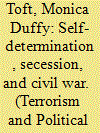

|
|
|
|
|
| Publication |
2012.
|
| Summary/Abstract |
The end of the Cold War led to the creation of almost two dozen new states, resulting from groups that advanced claims based on the legitimacy of national self-determination. These claims ranged from modestly increased autonomy to secession and independent statehood. As a result, and because a number of these claims escalated to violence, scholarly research into self-determination and secession has increased tremendously over the past two decades, with scholars examining the fate of these movements and associated violence and wars, from onset to the termination of associated violence and wars. This article assesses the state of the academic literature as it relates to the links between self-determination, secession, and civil wars. It begins with a discussion of what exactly is understood by such key concepts as ethnicity, self-determination, secession, and secessionist war. It then turns to the conditions and factors that have been identified in the literature to explain the emergence of self-determination and secession and why violence and war become potential outcomes.
|
|
|
|
|
|
|
|
|
|
|
|
|
|
|
|
| 15 |
ID:
112857


|
|
|
|
|
| Publication |
2012.
|
| Summary/Abstract |
While theoretical models of conflict often treat actors as unitary, most self-determination groups are fragmented into a number of competing internal factions. This article presents a framework for understanding the "dual contests" that self-determination groups engage in-the first with their host state and the second between co-ethnic factions within groups. Using a new data set of the number of factions within a sample of self-determination groups from 1960 to 2008, the authors find that competition between co-ethnic factions is a key determinant of their conflict behavior. More competing factions are associated with higher instances of violence against the state as well as more factional fighting and attacks on co-ethnic civilians. More factions using violence increases the chances that other factions will do so, and the entry of a new faction prompts violence from existing factions in a within-group contest for political relevance. These findings have implications for both theory and policy.
|
|
|
|
|
|
|
|
|
|
|
|
|
|
|
|
| 16 |
ID:
000738


|
|
|
|
|
| Publication |
London, Kluwer Law International, 1997.
|
| Description |
xx, 348p.
|
| Standard Number |
9041109463
|
|
|
|
|
|
|
|
|
|
|
|
Copies: C:1/I:0,R:0,Q:0
Circulation
| Accession# | Call# | Current Location | Status | Policy | Location |
| 042143 | 320.15/GEL 042143 | Main | On Shelf | General | |
|
|
|
|
| 17 |
ID:
111175
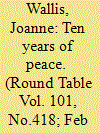

|
|
|
|
|
| Publication |
2012.
|
| Summary/Abstract |
Between 1989 and 1997 Bougainville endured a complex secessionist war and localised conflict in which it is estimated that as much as 10% of its population died and up to 40% were internally displaced. In light of the extreme scale of the destruction wrought by the war, it is somewhat surprising how successful the peace process has been. In 2001 a comprehensive political settlement, outlined in the Bougainville Peace Agreement, granted Bougainville extensive political autonomy and guaranteed that a referendum would be held on its political future 10-15 years after an autonomous government was formed. By 2005 Bougainvilleans had worked together to conduct a weapons disposal process, draft a constitution and establish the Autonomous Bougainville Government (ABG). This article considers the progress that Bougainville has made implementing autonomy by evaluating the performance of the ABG. It concludes by foreshadowing Bougainville's future prospects, including the role that autonomy and the deferred referendum have played in settling the self-determination dispute.
|
|
|
|
|
|
|
|
|
|
|
|
|
|
|
|
| 18 |
ID:
108147


|
|
|
|
|
| Publication |
2011.
|
| Summary/Abstract |
The history of Australian human rights policy in the developing world is chequered. Australia's most consistent contribution has been in socio-economic rights through its aid programme, and in its support for decolonisation. During the Cold War, a premium was placed on civil rights, in ideological opposition to communism. After the activism of the Evatt era from 1945 to 1949, and a hiatus until 1972, renewed engagement with multilateral institutions, in part as a way of influencing human rights in developing countries, came with the Whitlam, Fraser, Hawke/Keating and Rudd governments, while there was some retreat under the Howard government. All governments since the early 1970s have had considerable human rights successes (including through bilateral diplomacy) and some often dramatic failures; most have sacrificed human rights at some point for other strategic objectives. Governments have also struggled with their choice of means in confronting violations. There remains room for Australia to articulate a more effective human rights diplomacy.
|
|
|
|
|
|
|
|
|
|
|
|
|
|
|
|
|
|
|
|
|